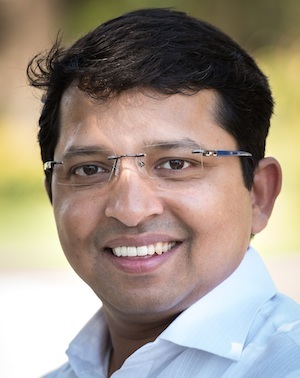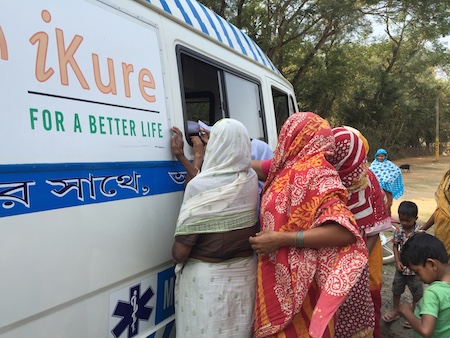Taking Technology to the Last Mile: After seeing inequities in rural health care in India, Sujay Santra invented iKure
Despite a compound annual growth rate of 16 percent in India’s health care sector overall, there are critical flaws in health care delivery when it comes to rural India, with serious shortages in facilities, manpower and resources. According to India’s 2011 national census, 70 percent of the country’s 1.2 billion people live in rural areas. According to the 2010 KPMG Health Report, these 840 million people in rural India are served by only 30 percent of the country’s medical professionals. The rural populations are thus subject to tremendous inequity in even basic health care services.
The iKure model
iKure is a rural health care social enterprise that addresses these gaps through a multifaceted approach. Recognizing the enormous burden of health care on rural populations, characterized by challenges of access, cost and quality, the iKure model is an integrated and comprehensive solution for delivering effective care at the grassroots level. iKure has successfully demonstrated how an appropriate technology, when paired with a network of physical clinics, community health workers and qualified medical professionals, backed by a committed management team and international research partners, can create measurable impact on the health of the communities served. The iKure model is scalable not only to other states and regions of India (operations have begun in four states already) but potentially also to other countries such as the Philippines and Kenya.
I started working with iKure (where I currently serve as vice president, research and programs) over a year ago, intrigued at first by the innovative model and the successes they have achieved, and over time getting deeply immersed in the work. In just a few years since inception, iKure has started 28 rural health centers operated from two main hub clinics, benefited more than 110 villages, profiled 58 diseases, screened 1,350,000 people and served over 80,000 patients. I am excited to write a series of blogs for NextBillion Health Care over the coming months about various aspects of rural health care delivery in India and the innovative iKure solutions.
Let’s start with a recent conversation I had with Sujay Santra, the founder and CEO of iKure, about some key entrepreneurial aspects of this health care social venture. Prior to taking an entrepreneurial leap to start iKure, Sujay had extensive experience in software development, having worked for several years at IBM and Oracle.
Sreyashi Dey: Tell us briefly how you started iKure and describe your reasons for setting it up as a social enterprise (for-profit) instead of a nonprofit.
 Sujay Santra (right): The seed of the iKure idea was sown when I went through a personal medical situation with my own father who did not get the right treatment in his hometown outside a metro city. It occurred to me then that when his situation, being educated and reasonably affluent, could be problematic, then the fate of millions of rural communities in remote areas is of grave concern. Despite the government’s efforts to provide primary health care, doctors in the clinics often do not attend, the infrastructure available is decrepit, supplies are not consistent, and the monitoring of health care setup is poor. I strongly felt the need for a private-sector solution and saw myself in the entrepreneurial role. I knew I wanted to provide health care delivery up to the last mile to the rural population, and given my background, leveraging technology seemed like a natural choice.
Sujay Santra (right): The seed of the iKure idea was sown when I went through a personal medical situation with my own father who did not get the right treatment in his hometown outside a metro city. It occurred to me then that when his situation, being educated and reasonably affluent, could be problematic, then the fate of millions of rural communities in remote areas is of grave concern. Despite the government’s efforts to provide primary health care, doctors in the clinics often do not attend, the infrastructure available is decrepit, supplies are not consistent, and the monitoring of health care setup is poor. I strongly felt the need for a private-sector solution and saw myself in the entrepreneurial role. I knew I wanted to provide health care delivery up to the last mile to the rural population, and given my background, leveraging technology seemed like a natural choice.
I decided to set up iKure as a for-profit social enterprise because I wanted to create a sustainable model that has built-in revenue streams so that the programs are not dependent only on grant and philanthropic support to continue. In addition, I believe the accountability that is brought about by an organizational structure that is investor-funded and working in alignment with market forces is effective. Having said that, our vision is completely driven by social objectives in terms of the need to make a lasting impact in improving health care of communities that have no access to it. I see no conflict between the two.
SD: Many bright young people have ideas they want to explore. What were some of the key steps you took to make your dreams operational, and also continue with it?
SS: I wanted to build a strong foundation for iKure. To this end, I dedicated substantial time to understand the health care needs and gaps in the remote rural communities. Studying the existing health care infrastructure to learn what is missing and what the critical requirements are; gathering information from community members, doctors, health workers and volunteers; understanding the role technology could play and the need to develop a low-cost and low-bandwidth technology solution (rather than an off-the-shelf product); and understanding the patient/customer demographics and mindsets formed the basis for my market research. Subsequently, I put a small team in place, developed the technology platform, sought medical expertise, decided on the operational clinic model and began to seek the initial funding. The key learning was that it is very important to do diligent groundwork to thoroughly understand the need and then devise a workable solution to address the problems. We have been able to continue and grow because we make it a priority to listen to our patients and community members so that our services remain relevant, as well as making sure that our operations run in a professional manner.
SD: What have been some of the greatest challenges in the last five years?

SD: What have been the unique innovations that iKure has brought to the rural health care delivery space in India?
SS: While technology is used to deliver health care in some rural areas, the iKure model is unique in combining our low-cost, low-bandwidth and innovative technology platform Wireless Health Incident Monitoring System (WHIMS) with our on-the-ground, brick-and-mortar, hub-and-spoke clinics staffed by accredited doctors and medical staff, and employing frontline health care workers to reach the remotest of communities. WHIMS is connected to specialized tertiary care facilities, enabling iKure to complete the connection to people in remote areas, the iKure clinics and the larger hospitals. WHIMS is also capable of integrating low-cost and innovative point-of-care devices to benefit the patients. Our mobile medical unit is a large van that is outfitted as a clinic, and is expanding our reach into additional remote areas. We conduct health camps for primary health as well as specialized ones such as for gynecology, pediatrics, heart and diabetes, providing health screening and awareness to very large numbers of rural populations. We are now developing our research capabilities by partnering with leading universities in the U.S. and Canada to implement research projects and programs that will ultimately benefit our communities.
—–
For more about the iKure model, check out the YouTube video below, which is part of Ericsson’s Networked Society project.
Sreyashi Dey is vice president, research and programs, at iKure.
- Categories
- Environment, Health Care
